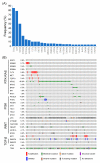Association between Altered Oncogenic Signaling Pathways and Overall Survival of Patients with Metastatic Colorectal Cancer
- PMID: 34943546
- PMCID: PMC8700603
- DOI: 10.3390/diagnostics11122308
Association between Altered Oncogenic Signaling Pathways and Overall Survival of Patients with Metastatic Colorectal Cancer
Abstract
Systemic characterization of genomic alterations into signaling pathways helps to understand the molecular pathogenies of colorectal cancer; however, their clinical implications remain unclear. Here, 128 patients with metastatic colorectal cancer (mCRC) receiving targeted next generation sequencing were retrospectively enrolled to analyze the impact of altered oncogenic pathways on clinical outcome. The datasets from Memorial Sloan Kettering Cancer Center were used for validation. In 123 patients with non-MSI-high tumor, the most common mutated gene was TP53 (84.6%), followed by APC (78.0%), KRAS (49.6%), and SMAD4 (22.8%). When mutated genes were allocated into signaling pathways defined as The Cancer Genome Atlas Pan-Cancer Analysis Project, alterations of cell cycle, Wnt, p53, RTK-RAS, PI3K, TGF-β, Notch, and Myc pathways were identified in 88%, 87%, 85%, 75%, 28%, 26%, 17%, and 10% of mCRC tissues, respectively. The survival analyses revealed that Myc and TGF-β pathway alterations were associated with a shorter overall survival (OS) (hazard ratio [HR]: 2.412; 95% confidence interval [CI]: 1.139-5.109; p = 0.018 and HR: 2.754; 95% CI: 1.044-7.265; p = 0.033, respectively). The negative prognostic impact of altered TGF-β pathway was maintained in patients receiving an anti-EGFR antibody. The OS of patients with mCRC carrying MYC and BRAF mutation was shorter than those with either MYC or BRAF mutation (HR: 4.981, 95% CI: 0.296-83.92; p = 0.02). These findings have clinical implications, such as prognosis prediction, treatment guidance, and molecular-targeted therapy development.
Keywords: genomic profiling; metastatic colorectal cancer; next-generation sequencing; oncogenic signaling pathways.
Conflict of interest statement
The authors declare no conflict of interest.
Figures





References
-
- Van Cutsem E., Cervantes A., Adam R., Sobrero A., Van Krieken J.H., Aderka D., Aranda Aguilar E., Bardelli A., Benson A., Bodoky G., et al. ESMO consensus guidelines for the management of patients with metastatic colorectal cancer. Ann. Oncol. 2016;27:1386–1422. doi: 10.1093/annonc/mdw235. - DOI - PubMed
Grants and funding
LinkOut - more resources
Full Text Sources
Research Materials
Miscellaneous

